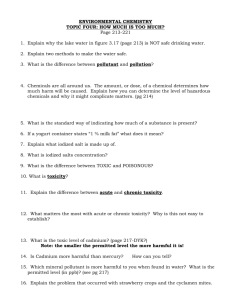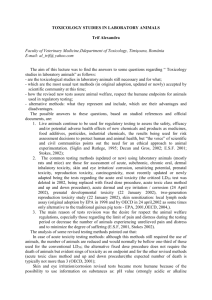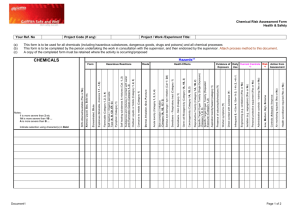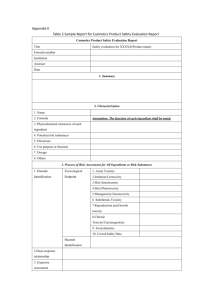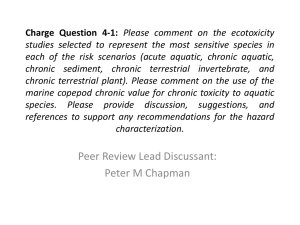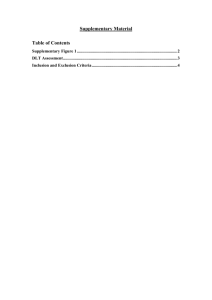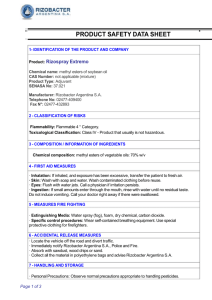MONSANTO Europe SA/NV
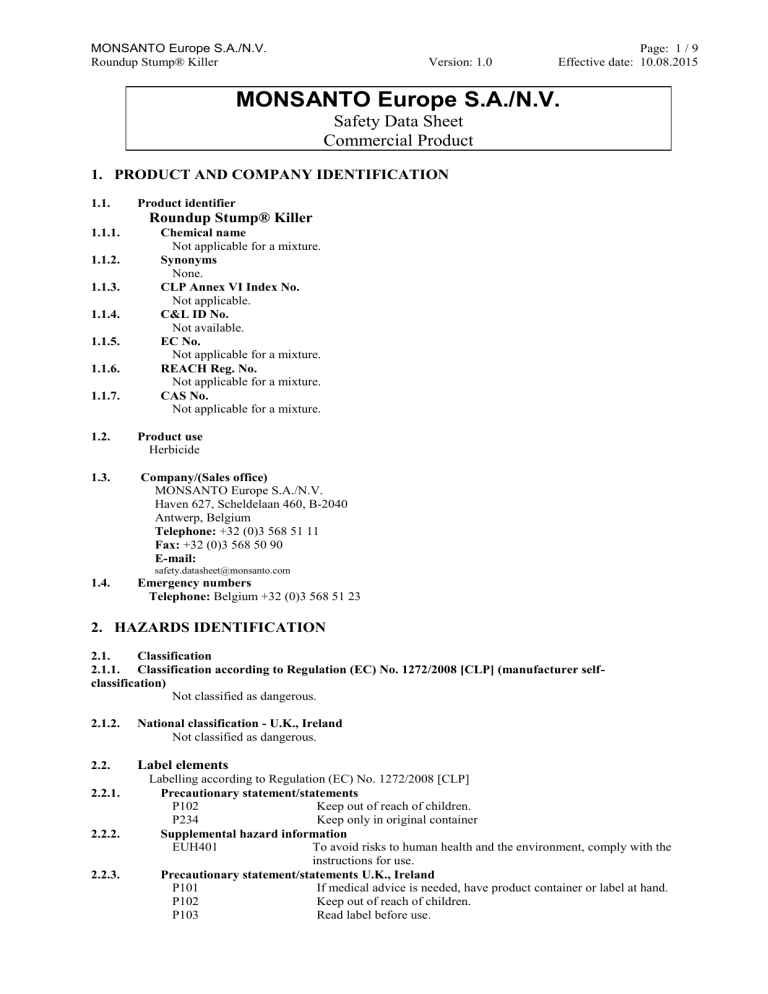
MONSANTO Europe S.A./N.V.
Roundup Stump® Killer Version: 1.0
Page: 1 / 9
Effective date: 10.08.2015
MONSANTO Europe S.A./N.V.
Safety Data Sheet
Commercial Product
1.
PRODUCT AND COMPANY IDENTIFICATION
1.1.
Product identifier
Roundup Stump® Killer
1.1.1.
1.1.2.
Chemical name
Not applicable for a mixture.
Synonyms
None.
1.1.3.
1.1.4.
CLP Annex VI Index No.
Not applicable.
C&L ID No.
Not available.
1.1.5.
EC No.
Not applicable for a mixture.
1.1.6.
1.1.7.
1.2.
REACH Reg. No.
Not applicable for a mixture.
CAS No.
Not applicable for a mixture.
Product use
Herbicide
1.3.
1.4.
Company/(Sales office)
MONSANTO Europe S.A./N.V.
Haven 627, Scheldelaan 460, B-2040
Antwerp, Belgium
Telephone: +32 (0)3 568 51 11
Fax: +32 (0)3 568 50 90
E-mail: safety.datasheet@monsanto.com
Emergency numbers
Telephone: Belgium +32 (0)3 568 51 23
2.
HAZARDS IDENTIFICATION
2.1.
Classification
2.1.1.
Classification according to Regulation (EC) No. 1272/2008 [CLP] (manufacturer selfclassification)
Not classified as dangerous.
2.1.2.
National classification - U.K., Ireland
Not classified as dangerous.
2.2.
2.2.1.
Label elements
Labelling according to Regulation (EC) No. 1272/2008 [CLP]
Precautionary statement/statements
P102 Keep out of reach of children.
P234 Keep only in original container
2.2.2.
2.2.3.
Supplemental hazard information
EUH401 To avoid risks to human health and the environment, comply with the instructions for use.
Precautionary statement/statements U.K., Ireland
P101 If medical advice is needed, have product container or label at hand.
P102
P103
Keep out of reach of children.
Read label before use.
MONSANTO Europe S.A./N.V.
Roundup Stump® Killer Version: 1.0
Page: 2 / 9
Effective date: 10.08.2015
2.3.
P234
P401
P501
Keep only in original container
Store product away from food and drink
Dispose of contents/container to a household waste recycling centre as hazardous waste except for empty containers which can be disposed of by recycling. Contact your local council for details.
Other hazards
0% of the mixture consists of ingredient/ingredients of unknown acute toxicity.
0% of the mixture consists of ingredient/ingredients of unknown hazards to the aquatic environment.
2.3.1.
Potential environmental effects
Not expected to produce significant adverse effects when recommended use instructions are followed.
Not a persistent, bioaccumulative or toxic (PBT) nor a very persistent, very bioaccumulative
(vPvB) mixture.
2.4.
Appearance and odour (colour/form/odour):
Brown /Liquid / Amino odour
Refer to section 11 for toxicological and section 12 for environmental information.
3.
COMPOSITION/INFORMATION ON INGREDIENTS
Active ingredient
Potassium salt of N-(phosphonomethyl)glycine; {Potassium salt of glyphosate}
Composition
Components CAS No.
EC No. % by weight
(approximate)
Potassium salt of glyphosate
Alkylpolyglycoside
Nitroryl
70901-12-1 933-437-9
68515-73-1 500-220-1
226563-63-9
EU Index No. /
REACH Reg. No. /
C&L ID No.
015-184-00-8 /
- /
02-2119694167-27-
0000
- /
01-2119488530-36 /
-
- /
- /
-
35
>5
>1
Classification
Aquatic Chronic - Category
2; H411; { c}
Eye damage/irritation -
Category 1; H318; { d}
Acute toxicity - Category 4,
Skin corrosion/irritation -
Category 2, Eye damage/irritation - Category
1, Aquatic Chronic -
Category 3; H302+332, 315,
318, 412
Water and minor formulating ingredients
- /
- /
-
<59
Full text of classification code: See section 16.
4.
FIRST AID MEASURES
Use personal protection recommended in section 8.
4.1.
4.1.1.
Description of first aid measures
Eye contact
Immediately flush with plenty of water. If easy to do, remove contact lenses. If there are persistent symptoms, obtain medical advice.
4.1.2.
Skin contact
Take off contaminated clothing, wristwatch, jewellery. Wash affected skin with plenty of water.
Wash clothes and clean shoes before re-use.
4.1.3.
Inhalation
Remove to fresh air.
4.1.4.
Ingestion
MONSANTO Europe S.A./N.V.
Roundup Stump® Killer Version: 1.0
Page: 3 / 9
Effective date: 10.08.2015
4.2.
4.2.1.
4.3.
4.3.1.
4.3.2.
Immediately offer water to drink. Do NOT induce vomiting unless directed by medical personnel. If symptoms occur, get medical attention.
Most important symptoms and effects, both acute and delayed
Potential health effects
Likely routes of exposure: Skin contact, eye contact
Eye contact, short term: Not expected to produce significant adverse effects when recommended use instructions are followed.
Skin contact, short term: Not expected to produce significant adverse effects when recommended use instructions are followed.
Inhalation, short term: Not expected to produce significant adverse effects when recommended use instructions are followed.
Indication of any immediate medical attention and special treatment needed
Advice to doctors
This product is not an inhibitor of cholinesterase.
Antidote
Treatment with atropine and oximes is not indicated.
5.
FIRE-FIGHTING MEASURES
5.1.
Extinguishing media
5.1.1.
Recommended: Water, foam, dry chemical, carbon dioxide (CO2)
5.2.
5.2.1.
Special hazards
Unusual fire and explosion hazards
Minimise use of water to prevent environmental contamination.
5.2.2.
Environmental precautions: see section 6.
Hazardous products of combustion
Carbon monoxide (CO), phosphorus oxides (PxOy), nitrogen oxides (NOx)
5.3.
Fire fighting equipment
Self-contained breathing apparatus. Equipment should be thoroughly decontaminated after use.
5.4.
Flash point
Does not flash.
6.
ACCIDENTAL RELEASE MEASURES
Use handling recommendations in Section 7 and personal protection recommendations in Section 8.
6.1.
Personal precautions
Use personal protection recommended in section 8.
6.2.
Environmental precautions
SMALL QUANTITIES: Low environmental hazard. LARGE QUANTITIES: Minimise spread.
Keep out of drains, sewers, ditches and water ways. Notify authorities.
6.3.
Methods for cleaning up
SMALL QUANTITIES: Flush spill area with water. LARGE QUANTITIES: Absorb in earth, sand or absorbent material. Dig up heavily contaminated soil. Collect in containers for disposal. Refer to section 7 for types of containers. Flush residues with small quantities of water. Minimise use of water to prevent environmental contamination.
Refer to section 13 for disposal of spilled material.
7.
HANDLING AND STORAGE
Good industrial practice in housekeeping and personal hygiene should be followed.
MONSANTO Europe S.A./N.V.
Roundup Stump® Killer
7.1.
7.2.
Version: 1.0
Page: 4 / 9
Effective date: 10.08.2015
Precautions for safe handling
Avoid contact with eyes.
When using do not eat, drink or smoke.
Wash hands thoroughly after handling or contact.
Do not contaminate drains, sewers and water ways when disposing of equipment rinse water.
Emptied containers retain vapour and product residue.
Observe all labeled safeguards until container is cleaned, reconditioned or destroyed.
Conditions for safe storage
Minimum storage temperature: -15 °C
Maximum storage temperature: 50 °C
Compatible materials for storage: stainless steel, fibreglass, plastic, glass lining
Keep out of reach of children.
Keep away from food, drink and animal feed.
Keep only in the original container.
Partial crystallization may occur on prolonged storage below the minimum storage temperature.
If frozen, place in warm room and shake frequently to put back into solution.
This formulation can be stored for 2 to 3 weeks at temperatures colder than -20°C without impact. If the temperature remains below -20°C for longer the water phase of the formulation may freeze.
Should this occur allow the product to warm and it will return to its original homogeneous state. We recommend that customers follow the typical use instructions which state that the container should be agitated (shaken) prior to pouring.
8.
EXPOSURE CONTROLS/PERSONAL PROTECTION
8.1.
Airborne exposure limits
Components Exposure Guidelines
Potassium salt of glyphosate
Alkylpolyglycoside
Nitroryl
No specific occupational exposure limit has been established.
No specific occupational exposure limit has been established.
No specific occupational exposure limit has been established.
Water and minor formulating ingredients
8.2.
8.3.
8.3.1.
8.3.2.
No specific occupational exposure limit has been established.
Engineering controls
No special requirement when used as recommended.
Recommendations for personal protective equipment
Eye protection:
If there is significant potential for contact:Wear chemical goggles.
Skin protection:
If repeated or prolonged contact:
Wear chemical resistant gloves.
8.3.3.
Respiratory protection:
No special requirement when used as recommended.
When recommended, consult manufacturer of personal protective equipment for the appropriate type of equipment for a given application.
9.
PHYSICAL AND CHEMICAL PROPERTIES
These physical data are typical values based on material tested but may vary from sample to sample. Typical values should not be construed as a guaranteed analysis of any specific lot or as specifications for the product.
Colour/colour range: Brown
MONSANTO Europe S.A./N.V.
Roundup Stump® Killer Version: 1.0
Page: 5 / 9
Effective date: 10.08.2015
Odour: Amino odour
Form: Liquid
Physical form changes (melting, boiling, etc.):
Melting point: Not applicable.
Boiling point: No data.
Flash point: Does not flash.
Explosive properties: No explosive properties
Auto ignition temperature: > 600 °C
Self-accelerating decomposition temperature (SADT):
No data.
Oxidizing properties: No data.
Specific gravity: 1,2647 @ 20 °C / 4 °C
Vapour pressure: No significant volatility; aqueous solution.
Vapour density: Not applicable.
Evaporation rate: No data.
Dynamic viscosity: 12,4 mPa·s @ 20 °C
Kinematic viscosity: 9,82 cSt @ 20 °C
Density: 1,2647 g/cm3 @ 20 °C
Solubility: Water: Completely miscible. pH: 4,1
Partition coefficient: log Pow: -3,2 @ 25 °C (glyphosate)
10.
STABILITY AND REACTIVITY
10.1.
Reactivity
Reacts with galvanised steel or unlined mild steel to produce hydrogen, a highly flammable gas that could explode.
10.2.
Stability
Stable under normal conditions of handling and storage.
10.3.
Possibility of hazardous reactions
Reacts with galvanised steel or unlined mild steel to produce hydrogen, a highly flammable gas that could explode.
10.4.
Incompatible materials
Incompatible materials for storage: galvanised steel, unlined mild steel
Compatible materials for storage: see section 7.2.
10.5.
Hazardous decomposition
Thermal decomposition: Hazardous products of combustion: see section 5.
11.
TOXICOLOGICAL INFORMATION
This section is intended for use by toxicologists and other health professionals.
Likely routes of exposure: Skin contact, eye contact
Data obtained on more concentrated products and on components are summarized below.
More concentrated formulation
Acute oral toxicity
Rat, LD50 : > 2.000 mg/kg body weight
No mortality.
Acute dermal toxicity
Rat, LD50 : > 2.000 mg/kg body weight
MONSANTO Europe S.A./N.V.
Roundup Stump® Killer Version: 1.0
Page: 6 / 9
Effective date: 10.08.2015
No mortality.
Skin irritation
Rabbit, 3 animals, OECD 404 test :
Redness, individual EU scores: 0,3; 0,0; 0,0
Swelling, individual EU scores: 0,0; 0,0; 0,0
Days to heal: 5
Eye irritation
Rabbit, 3 animals, OECD 405 test :
Conjunctival redness, individual EU scores: 0,7; 1,0; 0,7
Conjunctival swelling, individual EU scores: 1,0; 1,0; 0,7
Corneal opacity, individual EU scores: 0,0; 0,0; 0,0
Iris lesions, individual EU scores: 0,0; 0,0; 0,0
Days to heal: 3
Slightly irritating to eyes but not sufficient for classification.
Skin sensitization
Guinea pig, 9-induction Buehler test :
Negative.
No skin sensitization
N-(phosphonomethyl)glycine; { glyphosate acid}
Genotoxicity
Not genotoxic.
Carcinogenicity
Not carcinogenic in rats or mice.
Reproductive/Developmental Toxicity
Developmental effects in rats and rabbits only in the presence of significant maternal toxicity.
Reproductive effects in rats only in the presence of significant maternal toxicity.
12.
ECOLOGICAL INFORMATION
This section is intended for use by ecotoxicologists and other environmental specialists.
Data obtained on more concentrated products and on components are summarized below.
More concentrated formulation
Aquatic toxicity, fish
Rainbow trout (Oncorhynchus mykiss):
Acute toxicity, 96 hours, static, LC50: > 1.039 mg/L
Aquatic toxicity, invertebrates
Water flea (Daphnia magna):
Acute toxicity, 48 hours, static, EC50: 243 mg/L
More concentrated formulation
Aquatic toxicity, algae/aquatic plants
Green algae (Selenastrum capricornutum):
Acute toxicity, 72 hours, static, ErC50 (growth rate): 118 mg/L
Duckweed (Lemna gibba):
Acute toxicity, 7 days, static, ErC50 (frond number): 74,3 mg/L
Duckweed (Lemna gibba):
Acute toxicity, 7 days, static, NOEC (growth rate): 19,1 mg/L
Arthropod toxicity
Honey bee (Apis mellifera):
Contact, 48 hours, LD50: > 279 µg/bee
Honey bee (Apis mellifera):
Oral, 48 hours, LD50: > 282 µg/bee
Soil organism toxicity, invertebrates
MONSANTO Europe S.A./N.V.
Roundup Stump® Killer Version: 1.0
Page: 7 / 9
Effective date: 10.08.2015
Earthworm (Eisenia foetida):
Acute toxicity, 14 days, LC50: > 10.000 mg/kg dry soil
Soil organism toxicity, microorganisms
Nitrogen and carbon transformation test:
27 L/ha, 28 days: Less than 25% effect on nitrogen or carbon transformation processes in soil.
N-(phosphonomethyl)glycine; { glyphosate acid}
Avian toxicity
Bobwhite quail (Colinus virginianus):
Acute oral toxicity, single dose, LD50: > 3.851 mg/kg body weight
Bioaccumulation
Bluegill sunfish (Lepomis macrochirus):
Whole fish: BCF: < 1
No significant bioaccumulation is expected.
Dissipation
Soil, field:
Half life: 2 - 174 days
Koc: 884 - 60.000 L/kg
Adsorbs strongly to soil.
Water, aerobic:
Half life: < 7 days
13.
DISPOSAL CONSIDERATIONS
13.1.
Waste treatment methods
13.1.1.
Product
Follow all local/regional/national/international regulations on waste disposal. Follow current
13.1.2.
edition of the General Waste, Landfill, and Burning of Hazardous Waste Directives; and the
Shipment of Waste Regulation. According to the manufacturer self-classification, following the
EU Dangerous Preparations' Directive 1999/45/EC, the product can be disposed as a nonhazardous industrial waste. According to the manufacturer self-classification, following
Regulation (EC) No. 1272/2008 [CLP], the product can be disposed as a non-hazardous industrial waste. Disposal in an industrial waste incinerator with energy recovery is recommended. Keep out of drains, sewers, ditches and water ways.
Container
Follow all local/regional/national/international regulations on waste disposal, packaging waste collection/disposal. Follow current edition of the General Waste, Landfill, and Burning of
Hazardous Waste Directives; and the Shipment of Waste Regulation. Do NOT re-use containers.
Triple or pressure rinse empty containers. Pour rinse water into spray tank. Properly rinsed container can be disposed as a non hazardous industrial waste. Store for collection by approved waste disposal service. Recycle if appropriate facilities/equipment available. Recycle the nonhazardous container only when a proper control on the end use of the recycled plastic is possible.
Suitable for industrial grade recycling only. Do NOT recycle plastic that could end in any human or food contact application. This package meets the requirements for energy recovery. Disposal in a incinerator with energy recovery is recommended.
Use handling recommendations in Section 7 and personal protection recommendations in Section 8.
14.
TRANSPORT INFORMATION
The data provided in this section is for information only. Please apply the appropriate regulations to properly classify your shipment for transportation.
Not regulated for transport under ADR/RID, IMO, or IATA/ICAO Regulations
15.
REGULATORY INFORMATION
15.1.
Other Regulatory Information
SP1 Do not contaminate water with the product or its container.
MONSANTO Europe S.A./N.V.
Roundup Stump® Killer Version: 1.0
Page: 8 / 9
Effective date: 10.08.2015
15.2.
Chemical Safety Assessment
A Chemical Safety Assessment per Regulation (EC) No. 1907/2006 is not required and has not been performed.
A Risk Assessment has been performed under Regulation EC 1107/2009.
16.
OTHER INFORMATION
The information given here is not necessarily exhaustive but is representative of relevant, reliable data.
Follow all local/regional/national/international regulations.
Please consult supplier if further information is needed.
In this document the British spelling was applied.
|| Significant changes versus previous edition.
® Registered trademark.
This Safety Data Sheet has been prepared following the Regulation (EC) No. 1907/2006 (Annex II) as last amended by Regulation (EC) No. 2015/830
Data provided in this Safety Data Sheet are for the product as supplied unless otherwise indicated.
Classification of components
Components
Potassium salt of glyphosate
Alkylpolyglycoside
Nitroryl
Water and minor formulating ingredients
Classification
Aquatic Chronic - Category 2
H411 Toxic to aquatic life with long lasting effects.
Eye damage/irritation - Category 1
H318 Causes serious eye damage.
Acute toxicity - Category 4
Skin corrosion/irritation - Category 2
Eye damage/irritation - Category 1
Aquatic Chronic - Category 3
H302+332 Harmful if swallowed or if inhaled
H315 Causes skin irritation.
H318 Causes serious eye damage.
H412 Harmful to aquatic life with long lasting effects.
Endnotes:
{ a} EU label (manufacturer self-classification)
{ b} EU label (Annex I)
{ c} EU CLP classification (Annex VI)
{ d} EU CLP (manufacturer self-classification)
Full denomination of most frequently used acronyms. BCF (Bioconcentration Factor), BOD (Biochemical Oxygen Demand), COD
(Chemical Oxygen Demand), EC50 (50% effect concentration), ED50 (50% effect dose), I.M. (intramuscular), I.P. (intraperitoneal), I.V.
(intravenous), Koc (Soil adsorption coefficient), LC50 (50% lethality concentration), LD50 (50% lethality dose), LDLo (Lower limit of lethal dosage), LEL (Lower Explosion Limit), LOAEC (Lowest Observed Adverse Effect Concentration), LOAEL (Lowest Observed Adverse
Effect Level), LOEC (Lowest Observed Effect Concentration), LOEL (Lowest Observed Effect Level), MEL (Maximum Exposure limit),
MTD (Maximum Tolerated Dose), NOAEC (No Observed Adverse Effect Concentration), NOAEL (No Observed Adverse Effect Level),
NOEC (No Observed Effect Concentration), NOEL (No Observed Effect Level), OEL (Occupational Exposure Limit), PEL (Permissible
Exposure Limit), PII (Primary Irritation Index), Pow (Partition coefficient n-octanol/water), S.C. (subcutaneous), STEL (Short-Term
Exposure Limit), STOT SE (Specific Target Organ Toxicity, Single Exposure), STOT RE (Specific Target Organ Toxicity, Repeated
Exposure),TLV-C (Threshold Limit Value-Ceiling), TLV-TWA (Threshold Limit Value - Time Weighted Average), UEL (Upper Explosion
Limit)
Although the information and recommendations set forth herein (hereinafter "Information") are presented in good faith and believed to be correct as of the date hereof, MONSANTO Company or any of its subsidiaries makes no representations as to the completeness or accuracy thereof. Information is supplied upon the condition that the persons receiving same will make their own determination as to its suitability for the purposes prior to use. In no event will MONSANTO Company or any of its subsidiaries be responsible for damages of any nature whatsoever resulting from the use of or reliance upon information. NO REPRESENTATIONS OR WARRANTIES, EITHER EXPRESS OR
IMPLIED, OF MERCHANTABILITY, FITNESS FOR A PARTICULAR PURPOSE OR OF ANY
OTHER NATURE ARE MADE HEREUNDER WITH RESPECT TO INFORMATION OR TO THE
PRODUCT TO WHICH INFORMATION REFERS.
MONSANTO Europe S.A./N.V.
Roundup Stump® Killer
Safety Data Sheet (SDS) Annex
Chemical Safety Report:
Read and follow label instructions.
000000055127
Version: 1.0
Page: 9 / 9
Effective date: 10.08.2015
End of document
